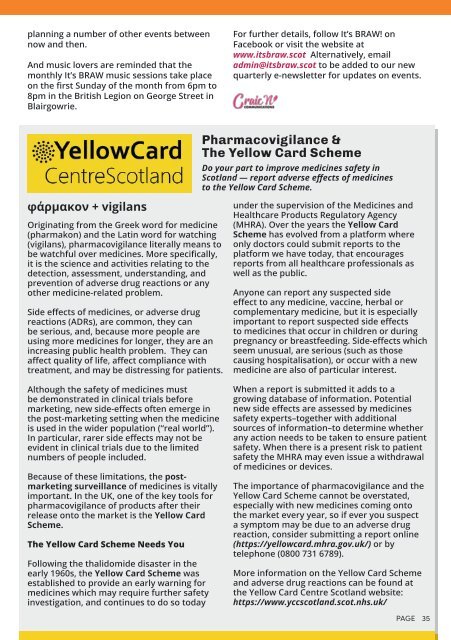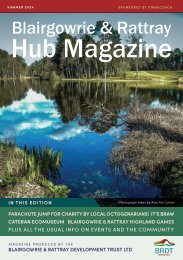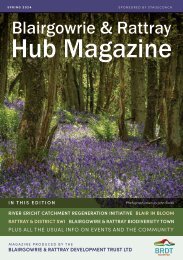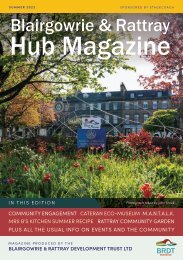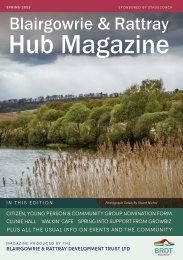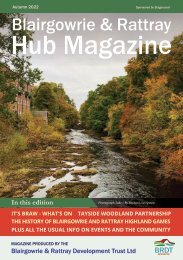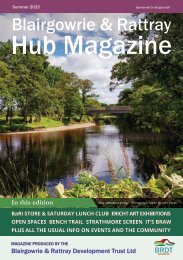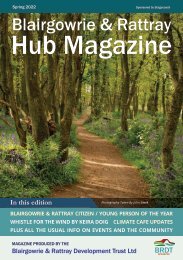Blairgowrie & Rattray Hub Magazine Winter 2023
The Autumn 2023 edition of the Blairgowrie & Rattray Hub Magazine. The latest news and articles from community groups and the public.
The Autumn 2023 edition of the Blairgowrie & Rattray Hub Magazine. The latest news and articles from community groups and the public.
You also want an ePaper? Increase the reach of your titles
YUMPU automatically turns print PDFs into web optimized ePapers that Google loves.
planning a number of other events between<br />
now and then.<br />
And music lovers are reminded that the<br />
monthly It’s BRAW music sessions take place<br />
on the first Sunday of the month from 6pm to<br />
8pm in the British Legion on George Street in<br />
<strong>Blairgowrie</strong>.<br />
For further details, follow It’s BRAW! on<br />
Facebook or visit the website at<br />
www.itsbraw.scot Alternatively, email<br />
admin@itsbraw.scot to be added to our new<br />
quarterly e-newsletter for updates on events.<br />
Pharmacovigilance &<br />
The Yellow Card Scheme<br />
Do your part to improve medicines safety in<br />
Scotland — report adverse effects of medicines<br />
to the Yellow Card Scheme.<br />
φάρμακον + vigilans<br />
Originating from the Greek word for medicine<br />
(pharmakon) and the Latin word for watching<br />
(vigilans), pharmacovigilance literally means to<br />
be watchful over medicines. More specifically,<br />
it is the science and activities relating to the<br />
detection, assessment, understanding, and<br />
prevention of adverse drug reactions or any<br />
other medicine-related problem.<br />
Side effects of medicines, or adverse drug<br />
reactions (ADRs), are common, they can<br />
be serious, and, because more people are<br />
using more medicines for longer, they are an<br />
increasing public health problem. They can<br />
affect quality of life, affect compliance with<br />
treatment, and may be distressing for patients.<br />
Although the safety of medicines must<br />
be demonstrated in clinical trials before<br />
marketing, new side-effects often emerge in<br />
the post-marketing setting when the medicine<br />
is used in the wider population (“real world”).<br />
In particular, rarer side effects may not be<br />
evident in clinical trials due to the limited<br />
numbers of people included.<br />
Because of these limitations, the postmarketing<br />
surveillance of medicines is vitally<br />
important. In the UK, one of the key tools for<br />
pharmacovigilance of products after their<br />
release onto the market is the Yellow Card<br />
Scheme.<br />
The Yellow Card Scheme Needs You<br />
Following the thalidomide disaster in the<br />
early 1960s, the Yellow Card Scheme was<br />
established to provide an early warning for<br />
medicines which may require further safety<br />
investigation, and continues to do so today<br />
under the supervision of the Medicines and<br />
Healthcare Products Regulatory Agency<br />
(MHRA). Over the years the Yellow Card<br />
Scheme has evolved from a platform where<br />
only doctors could submit reports to the<br />
platform we have today, that encourages<br />
reports from all healthcare professionals as<br />
well as the public.<br />
Anyone can report any suspected side<br />
effect to any medicine, vaccine, herbal or<br />
complementary medicine, but it is especially<br />
important to report suspected side effects<br />
to medicines that occur in children or during<br />
pregnancy or breastfeeding. Side-effects which<br />
seem unusual, are serious (such as those<br />
causing hospitalisation), or occur with a new<br />
medicine are also of particular interest.<br />
When a report is submitted it adds to a<br />
growing database of information. Potential<br />
new side effects are assessed by medicines<br />
safety experts–together with additional<br />
sources of information–to determine whether<br />
any action needs to be taken to ensure patient<br />
safety. When there is a present risk to patient<br />
safety the MHRA may even issue a withdrawal<br />
of medicines or devices.<br />
The importance of pharmacovigilance and the<br />
Yellow Card Scheme cannot be overstated,<br />
especially with new medicines coming onto<br />
the market every year, so if ever you suspect<br />
a symptom may be due to an adverse drug<br />
reaction, consider submitting a report online<br />
(https://yellowcard.mhra.gov.uk/) or by<br />
telephone (0800 731 6789).<br />
More information on the Yellow Card Scheme<br />
and adverse drug reactions can be found at<br />
the Yellow Card Centre Scotland website:<br />
https://www.yccscotland.scot.nhs.uk/<br />
PAGE<br />
35


